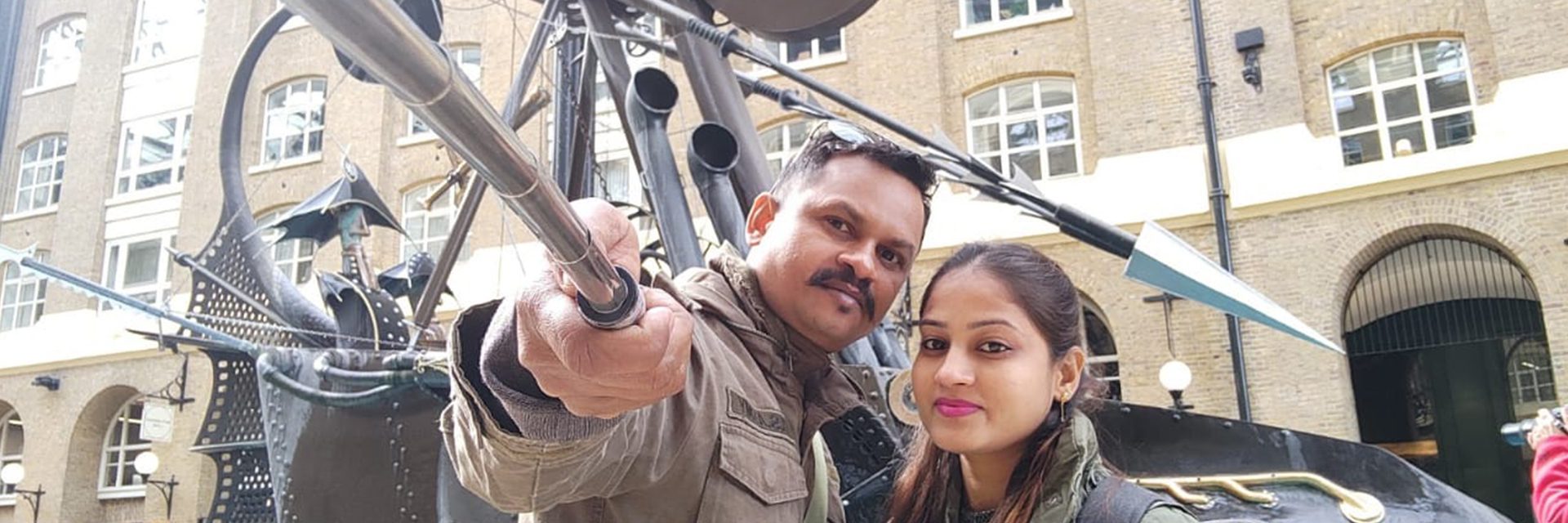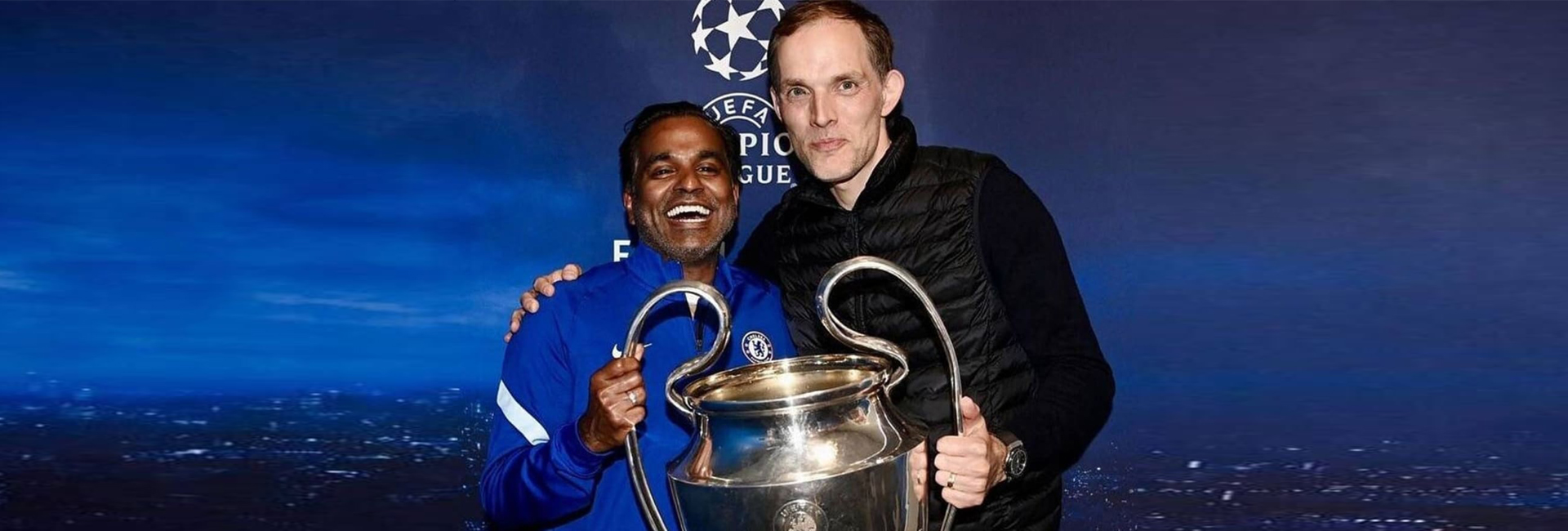(October 8, 2024) A seasoned coach, athlete, sports professional, and researcher Abhishek Dubey has spent over 18 years working in and out of Korea, the birthplace of Taekwondo, creating his own mark in the world of the martial arts. Korea’s deep-rooted connection to Taekwondo, with its rich history and tradition in the sport, has made his time there even more impactful. For the past 24 years, Abhishek has also been running Mumbai-based Indo-Korean Taekwondo Academy which has produced international athletes who have brought laurels for India. Abhishek’s work bridges the cultural and martial arts heritage of Korea with the growing Taekwondo scene in India, solidifying his standing in both the nations.
Recently, when one of his athletes, Rupa Bayor, achieved a world ranking of 9 and an Asian ranking of 2, it was a moment of great joy for Abhishek. “She is the first Indian to come in Top 10 World Rankings,” the coach shares with Global Indian with pride. “Seeing how sports can act as a means of intervention, especially for athletes from underprivileged backgrounds, is the most satisfying part of this journey,” he reflects. “It’s not just about winning medals—it’s about how sports can change lives.”
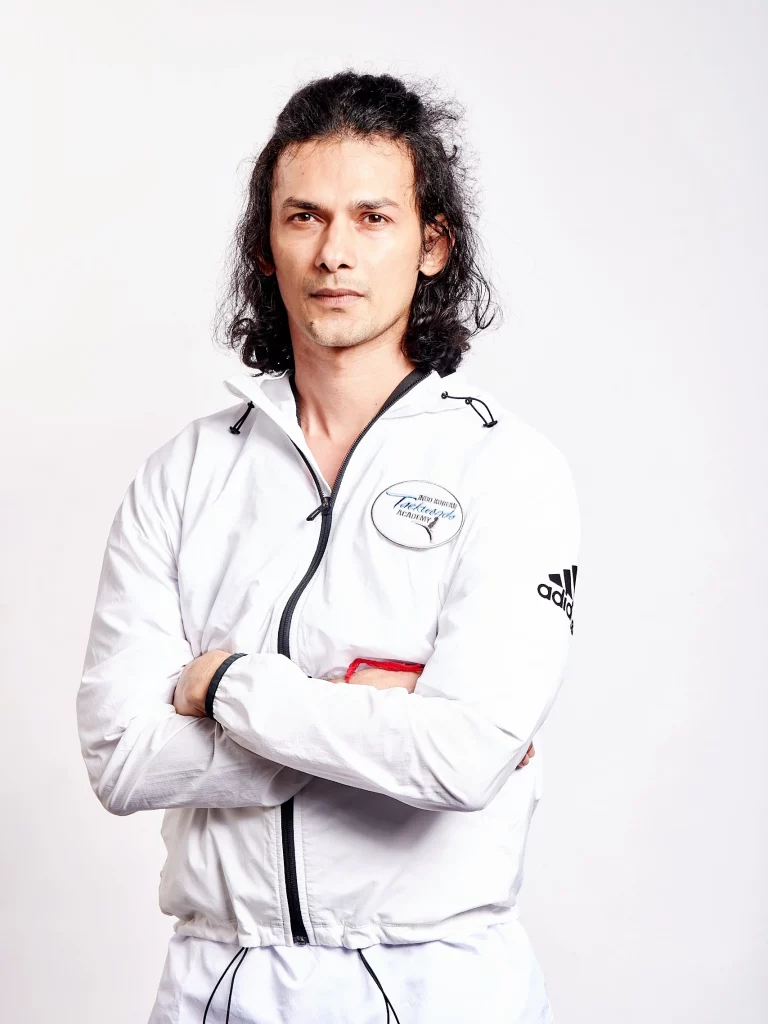
Abhishek Dubey
Falling in love with Taekwondo
Growing up in the suburbs of Chembur, Mumbai, the celebrated Taekwondo coach spent his childhood immersing himself in the offerings of the sports club at RCF Colony. In 1991, when he was 11, a newly established Taekwondo club at the sports facility caught his eye with its crisp uniforms and disciplined training sessions. What began as a mere curiosity quickly evolved into a lifelong passion. Under the guidance of Master Sunil Saxena and Late Rajesh Menon, Abhishek embarked on a journey in Taekwondo, eventually representing India at international events and winning numerous medals.
Abhishek’s expertise and deep passion for the martial art not only shaped his own life but also had a great impact on the athletes he coached, many of whom have gained international recognition and rankings in Taekwondo. His dedication to the sport also led to a lasting connection with South Korea, where he continues to work professionally in the field of Taekwondo. He is also pursuing a PhD at Hankuk University of Foreign Studies in Seoul, focusing on sports as development tool in empowering women.
From athlete to coach
As an athlete, Abhishek Dubey’s achievements speak volumes. From participating in the SAI Open Nationals in 2001, narrowly missing a medal at the Korea Open in 2012, to winning gold and the Best Poomsae Athlete Award at the 2013 Korean Ambassador’s Cup, his career is filled with moments of personal triumph. Yet, he humbly acknowledges that his most significant accomplishments lie not in his individual accolades but in his role as a coach.
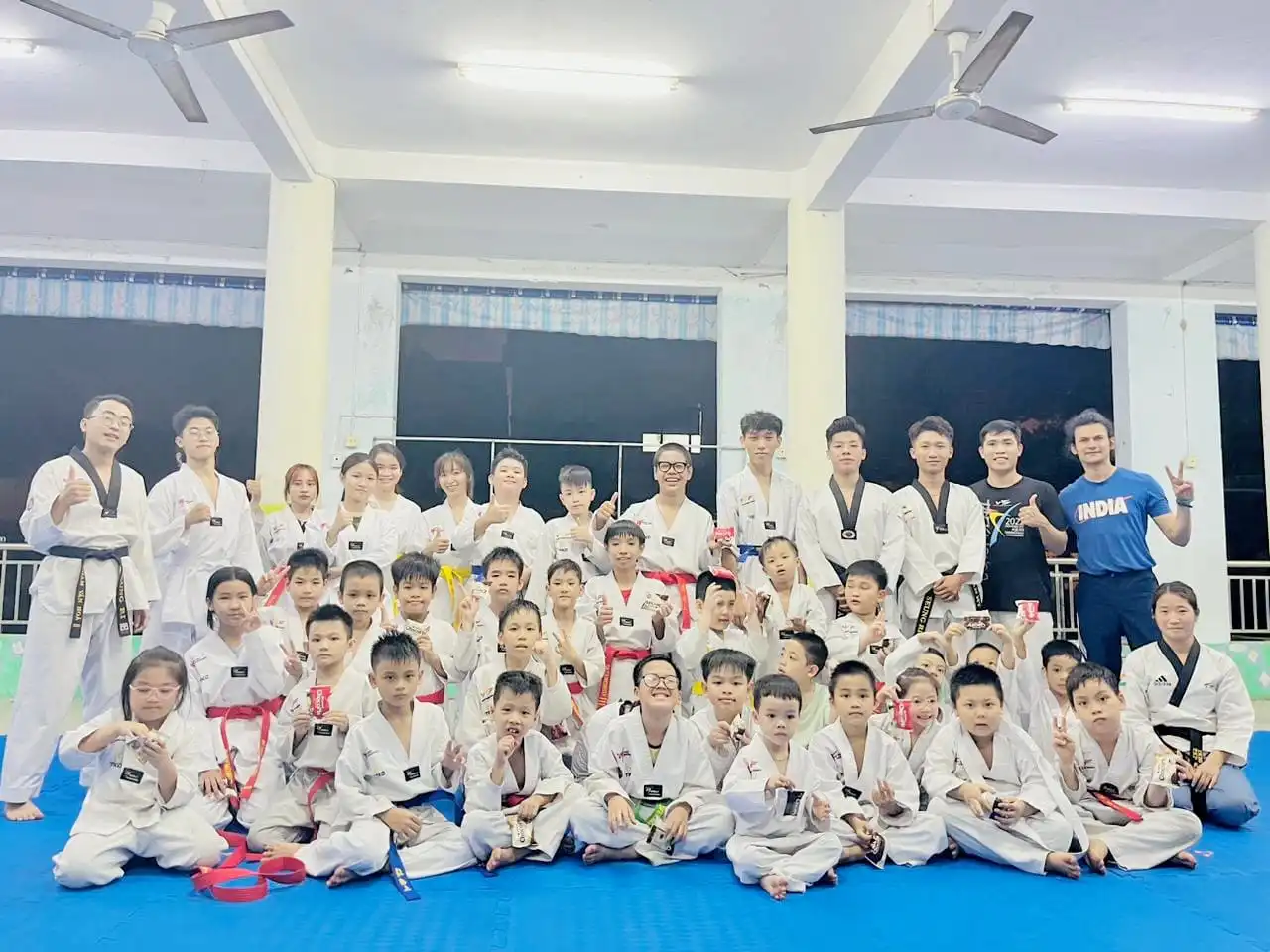
Coach Abhishek during the training for the 8th Asian Taekwondo Poomsae Championships in Vietnam
He has nurtured medalist for India at the 2024 Asian Taekwondo Championships, Australian Open, Oceania Open, WT President Cup Oceania, WT President Cup Europe, Croatia Open, XIII South Asian Games, VI Commonwealth Taekwondo C’ships Scotland, 2015 Korea Open, and the 2010 Yeongcheon Open.
The Indo-Korean Taekwondo Academy in Mumbai, which he co-founded with his childhood friend Chakrapani Koirala at the age of 20, just before graduating from university, embodies his commitment to the martial art. “What began as a part-time club has blossomed over the last 24 years into a training ground for elite athletes. Above all, it is a place for good Taekwondo practitioners with rich human values,” he says.
Watching his athletes gain international success
His greatest fulfilment as a coach comes from watching his athletes achieve international success. Some of his proudest moments include Ishee Pardeshi’s victory at the Yeongcheon Open in 2010, her triumph at the 2014 Commonwealth Taekwondo Championships, and her strong performances at the Croatia Open and the Asian Championships.
“The journey has been fulfilling every day,” he reflects. Recently, seeing one of his athletes, Rupa Bayor, win India’s first Asian medal in Taekwondo Poomsae has been especially satisfying for him. “Considering the challenges she faced, coming from a background where opportunities are scarce, her success is even more meaningful. When she first arrived in Mumbai on our scholarship program, she wasn’t ranked in the top 500 WT World rankings, and today she’s ranked 9th in the world and 2nd in Asia, becoming the first Indian to come in Top 10 World Rankings. It’s incredibly rewarding to see how sports can serve as a means of intervention, helping to shape a young athlete’s career and life,” he mentions.
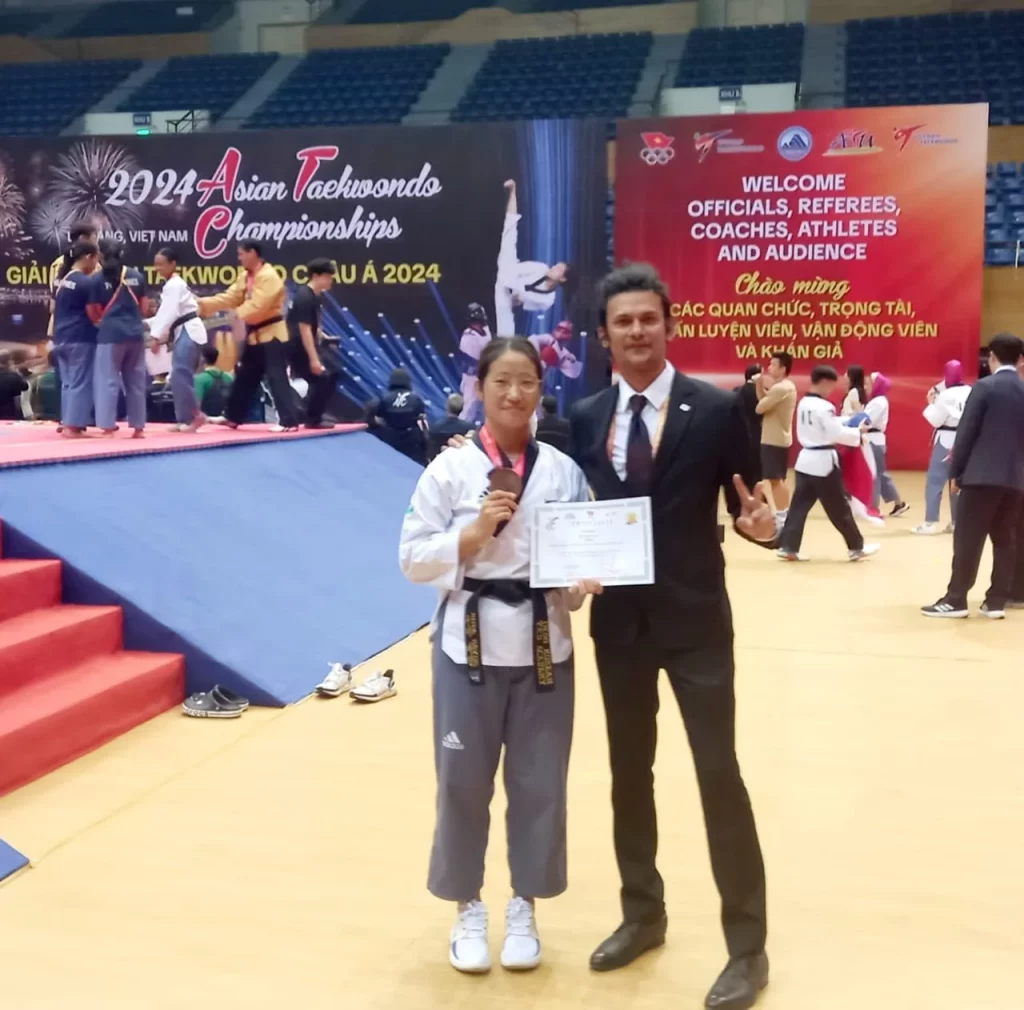
Coach Abhishek Dubey with Athlete Rupa Bayor
Special connection with Korea
Abhishek has been traveling to Korea since 2007 for international Taekwondo championships and sports education, continuing until 2015.
Then in 2015, he received a full scholarship from the Sports and Culture Ministry of the Republic of Korea to pursue a Master’s in Global Sports Management, which opened new doors in sports research and management. “Since then, I’ve been involved in research work on sports for development. So yes, it’s been 18 years of going back and forth between Korea, and now I’ve been pursuing my Ph.D. since 2020,” he says.
Abhishek is writing his thesis on the impact of sports development programs in empowering women in India. “It’s been overwhelming and time-consuming. At times, my professional commitments have derailed my Ph.D., but seeing young athletes grow in the sport brings me immense joy,” says the coach who frequently returns to India to nurture elite athletes who represent the country.
It’s exhausting at times – managing the academy and athlete development in India, and my research and other professional engagements in Korea – but I continue my PhD without neglecting my duties towards Taekwondo because I believe that while there are plenty of PhD scholars in India, there is yet to be a world champion in our sport. That’s my quest: to create one in the near future.
Abhishek remarks
Celebrating Taekwondo and its Korean heritage
Taekwondo is more than just a sport in Korea; it is a national treasure. It promotes perseverance, respect, humility, and integrity in practitioners who are taught to uphold these values in their daily lives. The sport is often integrated into school curricula, emphasising its importance in the formation of character and discipline by training the body and mind of the youngsters.
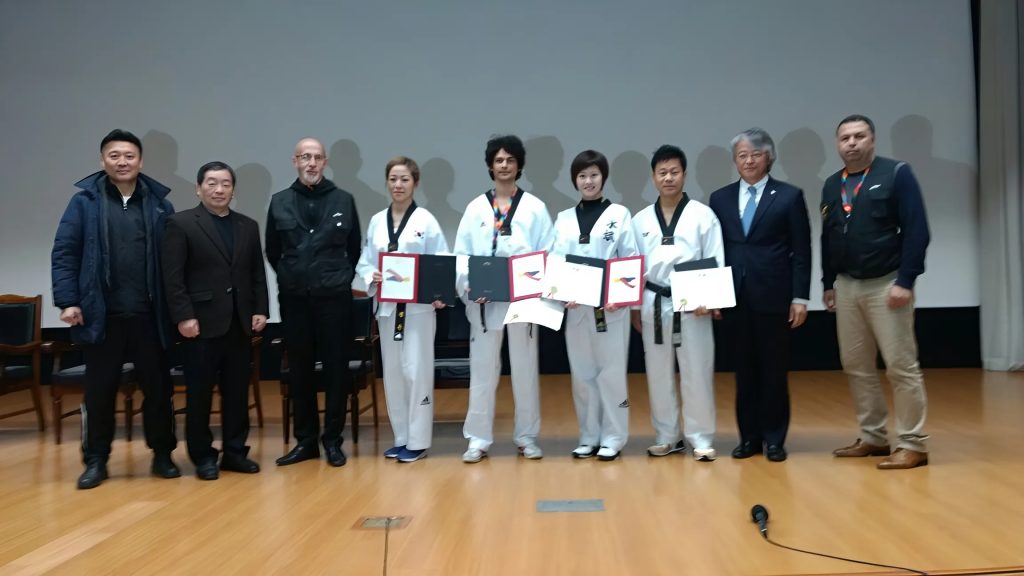
Abhishek Dubey at the International Referee Seminar conducted by the World Taekwondo Federation where he became the first Indian Taekwondo Referee to win the coveted Best Participant Award for Kyoroogi in South Korea
Taekwondo is one of the oldest martial arts of the world, originating in Korea over 2,000 years ago. The name reflects its essence: Tae (foot), Kwon (hand), Do (art). Its roots can be traced back to ancient Korean martial arts, including Taekkyeon and Hwa Rang Do, practiced by warriors and royal families. Taekwondo began to take shape as a unified martial art form under the influence of various masters who sought to promote Korean culture and heritage after the Korean war (1950-53). In 1955, the term ‘Taekwondo’ was officially adopted, and the sport quickly gained popularity both in Korea and internationally.
Translating to ‘the way of the foot and fist,’ Taekwondo has become a global phenomenon, and Abhishek is proud to play his part in it. “It’s been a beautiful experience. Will always be indebted to the love, knowledge, friendships and bonds that have been built through the sport of Taekwondo in Korea,” he remarks.
Life in Korea
Abhishek has worked as a researcher with the Seoul Olympic Museum, served as a Communication Manager for the Gangwon 2024 Youth Olympic Games, and worked as a Research Assistant at Hankuk University of Foreign Studies, describing it as “an experience of a lifetime.” He shares, “I cherish every opportunity that my 18 years of travel in and out of Korea have brought to my life, and I love engaging with the sport and culture here.”
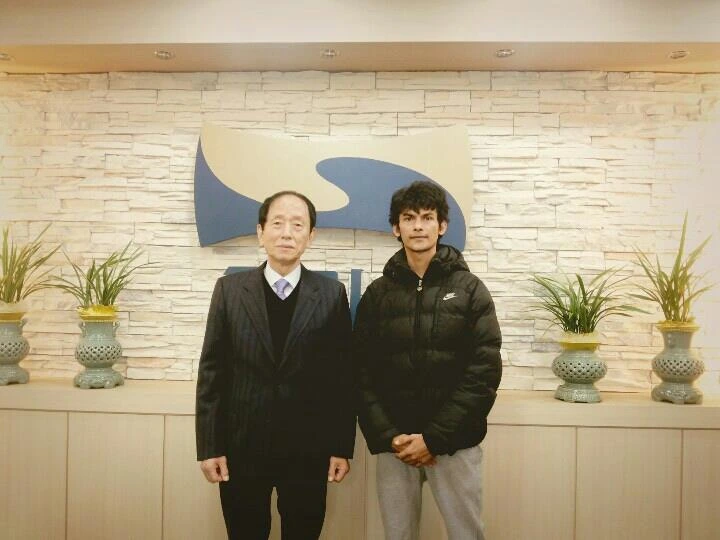
Abhishek Dubey with Kukkiwon President Grandmaster Man Soon Jung in 2014
The coach and researcher can communicate in Korean, having studied the language during his university days in Korea. “I am still trying to learn more,” he remarks.
An ambassador of India in Korea
The Indian community in Korea is diverse, consisting of professionals, students, and skilled workers who contribute significantly to various sectors, including technology, education, hospitality, and business. “Of late, the India diaspora is growing especially with students and people in the IT industry,” remarks Abhishek.
Many Indian students are attracted to Korea’s advanced educational institutions and its emphasis on research and innovation. Scholarships and programs aimed at international students have further encouraged this trend, with Abhishek serving as a prime example.
As a professional, scholar, and coach in the world of Taekwondo, a national heritage of Korea, Abhishek Dubey is contributing to strengthening Indo-Korean ties in his own way.
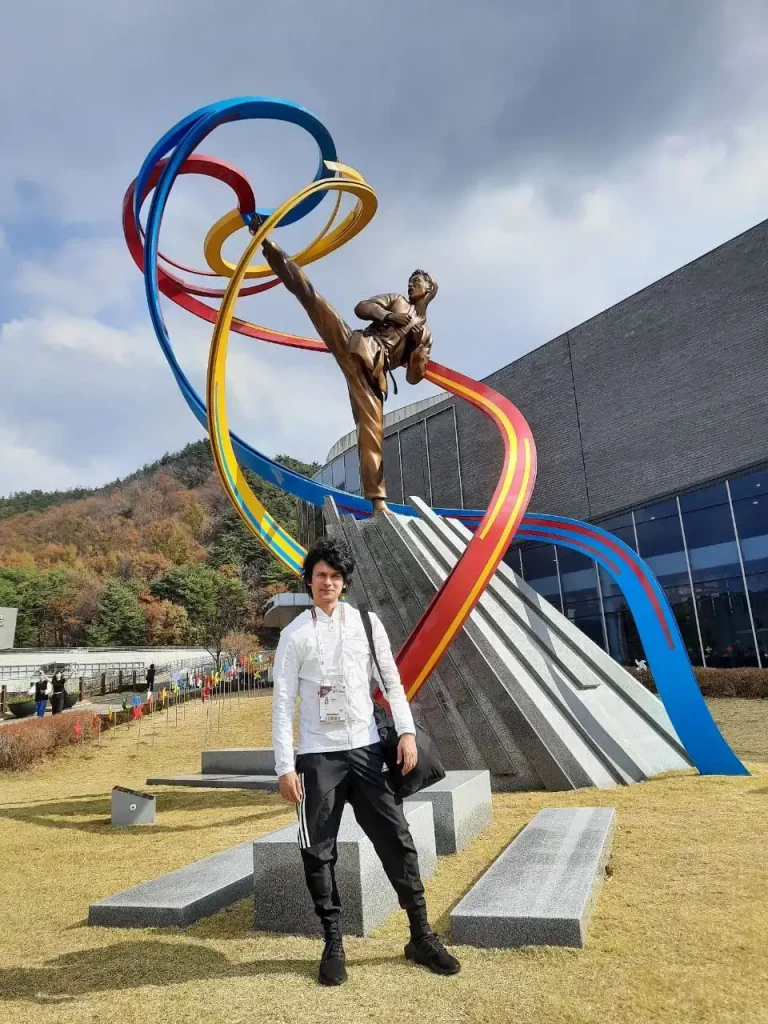
Abhishek Dubey
Plans for future – giving back and elevating India’s position
Abhishek aims to apply his expertise in both sports management and the martial art form to support the growth of India’s Taekwondo community in different capacities and in several meaningful ways.
“I would love to establish an Elite Athlete Taekwondo Training Program/Center for youth from marginalised communities in India and develop a concrete plan to create India’s first World Champion in the Olympics,” he signs off with a determination to keep empowering the next generation of athletes and elevate India’s presence in the global Taekwondo rankings.



